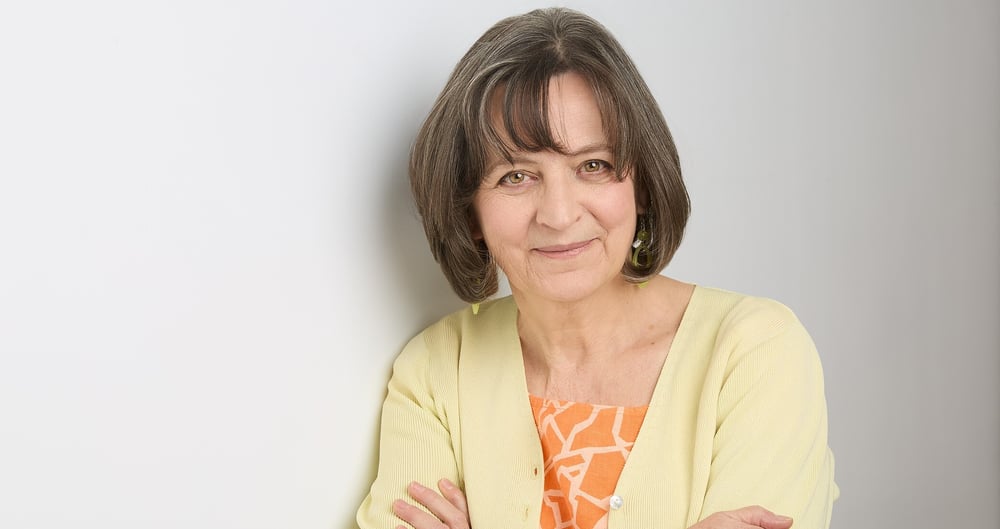Why Dr Kathryn Mannix wants our family conversations to ‘keep the end in mind’
10 September, 2025 5 min read

Palliative care advocate and speaker Dr Kathryn Mannix has been a palliative medical specialist for most of her life. So, when she explains how her own family has approached the end-of-life wishes of her parents, ears all over the world should prick up.
But it turns out, it’s as much a cautionary tale as a set of guidelines.
Kathryn explains that her parents wanted to give her power of attorney for health and welfare, for obvious reasons, but she was having none of it.
‘I'm the last person they should be giving those powers to!’ she said.
‘I've got all of the ideas and stepping stones in my head completely clear already, while none of my siblings do. With my understanding, coming from 40 years of watching other families figuring it out, I shouldn’t be making those decisions on behalf of everybody else. I should just be the advisor.’
A family meeting followed, where it became apparent that none of them really knew what their parents would want when the time came. Even her parents were wrong about each other.
‘Dad told us he’d not want further treatment when he was unable to do what mattered to him, and said he knew Mum would feel the same,’ continued Kathryn.
‘And Mum’s face just dropped! So, here's the person who's been married to her for 60 years, and it turns out they felt differently.’
Kathryn describes her close family as ‘highly functional, where everyone loves one another’, but where – in the absence of clearly articulated wishes – they had made assumptions.
‘It's a really helpful illustration of the fact that there's no manual for this – your family has to figure it out, and the only way you can figure it out is by talking about it,’ said Kathryn.
There's no manual for this – your family has to figure it out, and the only way you can figure it out is by talking about it.
Kathryn will be in Sydney in June at the International Dementia Conference 2026, speaking on the main stage about death – our own, our family’s, and those of the people we care for – and how to prepare for it.
As Kathryn says, ‘I’ve spent my whole career working alongside dying people, and learning from them. Now, I want to share their wisdom with the world.’
The talk will particularly address end-of-life conversations in the context of dementia.
‘I hear often from bereaved people who've experienced difficulties for their person at the very end of life, when it's been difficult for their person to express their own wishes due to cognitive impairment,’ Kathryn said.
‘They’re asking, ‘How do I have these conversations?’ Because how do we know that what they’ll want now is what they’ll want then? Or, if they’re really clear about what they want now, many find it difficult to envisage how they’ll feel in 10 years’ time, with substantial changes to the way they view the world and relate to people.
‘How do we talk about dying with a person who may lose the ability to have that conversation in a meaningful way, far sooner than their body will actually die? How do we talk about what the process of it will be like? How is the process changed in the dementia journey compared with, for example, cancer?’
How do we talk about dying with a person who may lose the ability to have that conversation in a meaningful way, far sooner than their body will actually die?
Unlike cancer, she points out, dementia care is generally under-resourced, and dementia itself poorly understood by the average person. People living with dementia and their families are often unprepared for how long they’ll have before these discussions become impossible.
Kathryn wants to normalise end-of-life conversations among loved ones so that some of the stress is taken out of decisions in emergency rooms, and care staff are empowered to act on the person’s preferences.
‘One of the things I like to talk about is dying safely, without confusion and drama,’ she said. ‘And if somebody's going to do their dying safely at the far end, what are the things that we've put in at the front end, the safety rails? One of those things could be having that conversation with family.’
As she points out, there are ‘no workarounds for daunting conversations’. But by changing how we approach death, we can, in fact, change lives – bringing peace and comfort, to the very last breath.
Don’t miss out on hearing Dr Kathryn Mannix speak at #IDC2026, 4-5 June 2026 at the Hilton, Sydney. She’ll also be signing her bestselling books, With the End in Mind and Listen, for delegates. Be the first to hear about Early Bird registrations - scroll down to sign up to our newsletter.
The whole person.
The whole point.
She’s a wife, a mum and a nana.
She lives in a little cottage in the UK, ‘miles from anywhere’.
She adores her chickens (who are not averse to a cuddle now and then).
She plays guitar and loves to sing, especially with a choir.
Add your voice to the conversation
We’re calling for papers to be presented at #IDC2026! Tell us about your work to transform dementia and palliative care, but don’t wait – call for papers closes 24 November 2025.